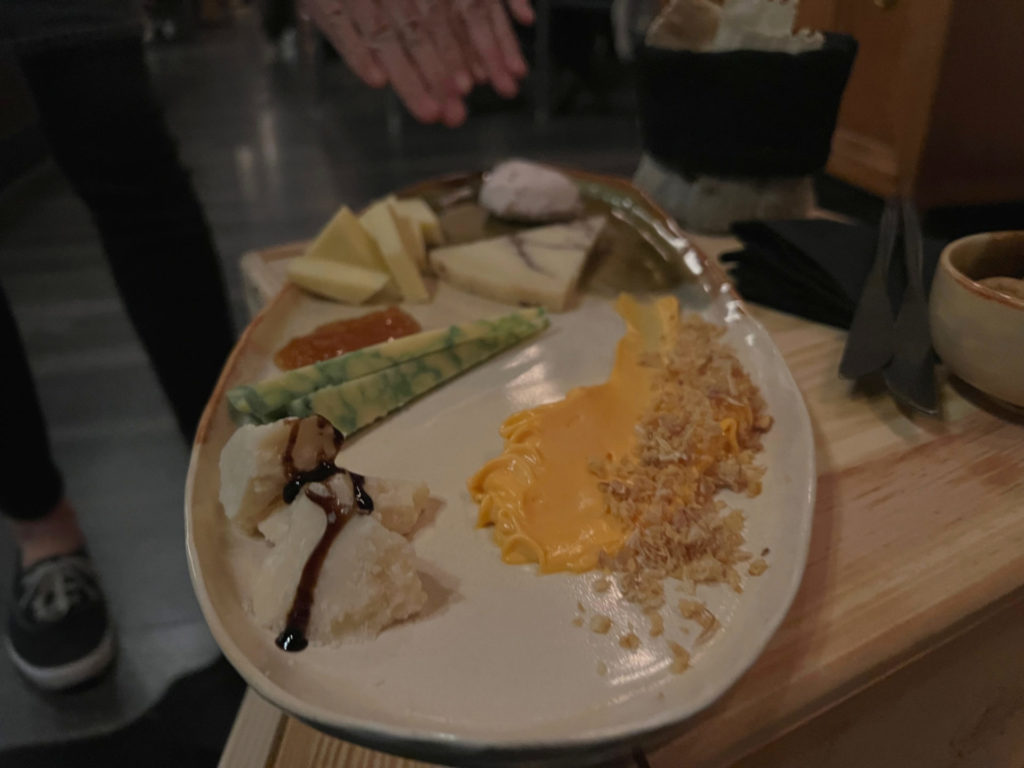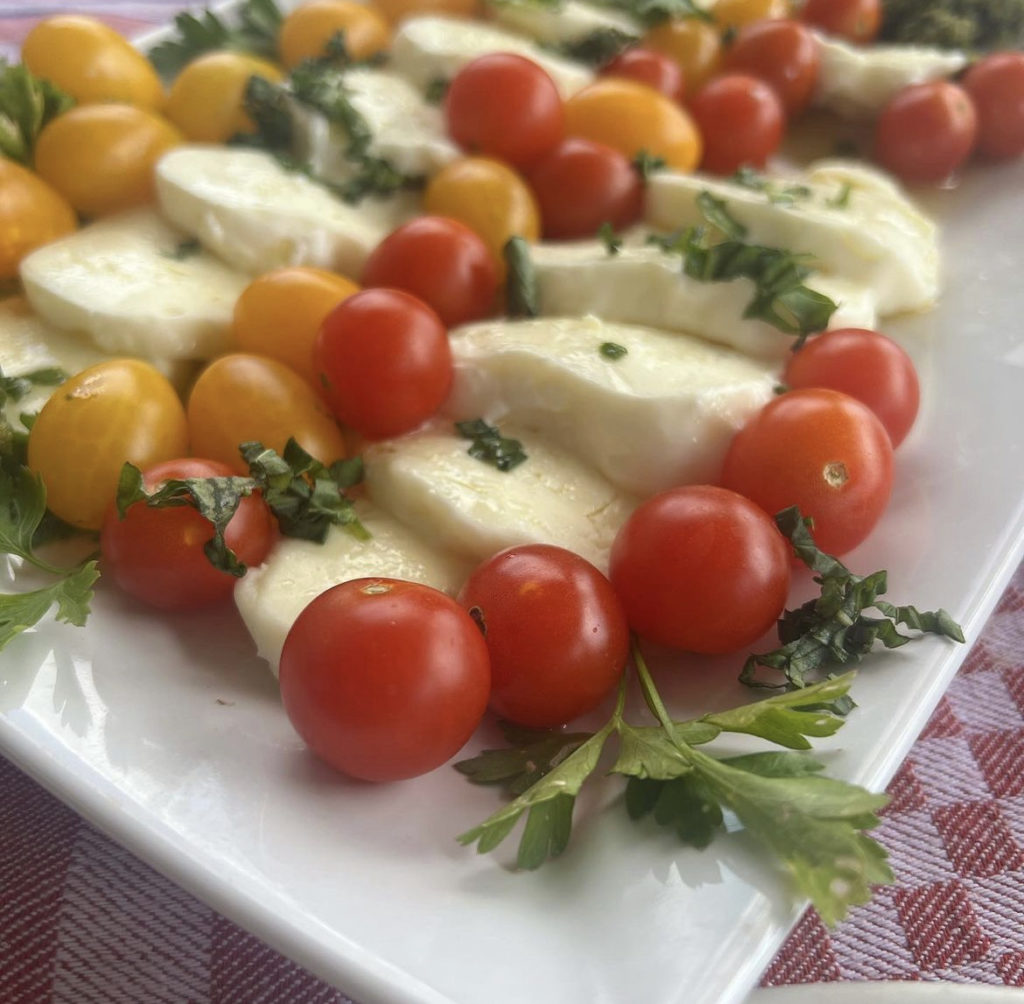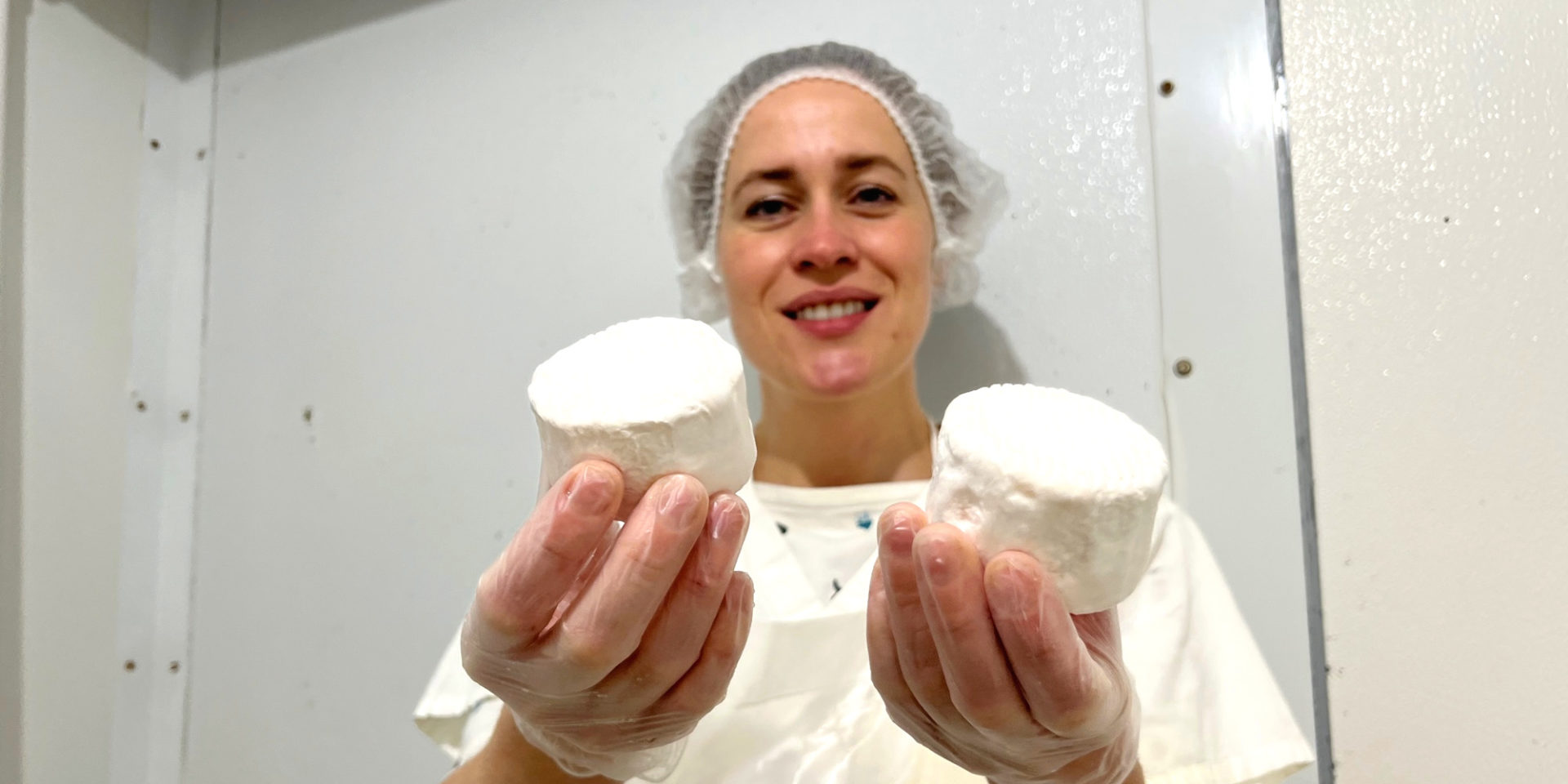The award-winning cheese by Prairie Fruits Farm & Creamery is a staple for cheeselovers in Champaign-Urbana and nationwide. Owned by married couple Wes Jarrell and Leslie Cooperband, Prairie Fruits Farm is more than very cute baby goats. The Champaign goat farm has a small orchard, an herb garden, a farm store/restaurant, and, of course, a creamery where they make cheeses, gelato, and yogurt. Recently, Prairie Fruits Farm & Creamery hired a cheesemaker with international experience, Tetyana Dyadechko, to join the team.
Over glasses of wine and a cheeseboard at Ladro Enoteca in Downtown Champaign, I chatted with Dyadechko about her journey from Ukraine to Champaign, Illinois. We talked about everything from growing up in Ukraine to how she greets the goats each morning in this heartfelt conversation about cheese, the war, and what’s important to Prairie Fruits Farm & Creamery’s new cheesemaker.

This interview has been edited for length and clarity.
Smile Politely: Tetyana, thank you for chatting with me. How did you arrive in Champaign-Urbana to make cheese?
Dyadechko: It was last October, I think — beginning of October, I just finished my job in Switzerland. It was 100 days without a day off. It was crazy, and I finished and didn’t know what to do. One of my friends from Ukraine called me, and she told me, “Do you know [there is] some farm in the USA looking for a cheesemaker?”
“Oh, no, no, no. I’m tired,” I said.
“I remember you told me you have a dream to try to go in USA to see that market.”
And I said, “Okay, really, it’s my dream. Why I don’t follow my dream because I’m tired? Because some emotions take my heart?” So, after few days, I went to Ukraine to see my family, and we had a Zoom call with Leslie and Wes. We’re talking, and in the first hour we meet, it was a yes, a perfect match. So, why not come?
SP: How long after the the Zoom call was it before you arrived here in Champaign?
Dyadechko: Before the first Zoom call, I was not sure, but then it was a match, and it was nice. My parents, they live in Ukraine in Poltava, in the east part of Ukraine; it’s a safe place still, and I hope it will stay.
I told to my parents about the job, and my mom asked, “Do you know these people?” No. “Do you know this place?” No. “Are you crazy?!”
I said, “Mom, I am grown; I can do what I want.” After the really first good conversation with Leslie and Wes, we both understood that we could give a lot to each other during this time. They give me a lot of knowledge as I give to them.
SP: When did you learn about cheese?
Dyadechko: In my kitchen in my apartment. First, it was love. I was in love with cheese. In Israel, I visited some small goat farm. In that time, I had good job, but it was with economic with financials. It was busy. It was all the time. Running and running — and I didn’t see life. So it was a business trip to Israel, and we had a small visit to a goat farm where they produce cheese, too. We drank wine, and I was sitting there and looking at all this, like: sunset, cheese, goats. Thinking, oh my God, I’m in paradise.
Happy farmers — it was a young couple, she from Israel and he from Holland. And they were so happy. I saw how they loved their job, how they loved each other. Two years after the trip, I left my job and started making cheese at home. At first, it was experiments because I didn’t have knowledge. I just did what I could do. I asked Google, “Google, how to make cheese?” What I found, I learned, and I was just learning, learning. It was my passion.

SP: What was the first cheese recipe you made?
Dyadechko: At first, I didn’t understand how to make cheese. It was just cow’s milk. Soft, fresh cheese — in Ukraine, it’s called Bryndza, a lot like feta cheese. I did the cheese in my childhood. My grandmother and my parents had cows at home. My parents had four cows.
SP: Four cows?! Were they farmers?
Dyadechko: No, they were not farmers; they had regular jobs. After USSR rocket, we had a really bad life in Ukraine. We didn’t have money, but if you don’t have money, you can make food. So my parents had pigs, cows, rabbits, chicken, goose, ducks. A lot of them, but yes — all food animals.
SP: Did you eat the rabbits?
Dyadechko: Yes, everything we eat. We had a big yard where we were growing potatoes, greens, tomatoes, and cucumbers. You know, my parents had regular jobs — normal jobs from eight until five. My sister and I would go to school, and we’d be back around 1:00 p.m. and start to feed animals.
SP: Did you like feeding the animals?
Dyadechko: So, at that moment, no. I hated animals. I hated milk because I needed to milk the cows by hand. I had a dream that when I would be an adult, I never will have farm animals.
SP: And now you’re on a goat farm!
Dyadechko: I had good lessons from my life, like never say never. Because if you tell, “I never —” it will happen to you.

SP: You’ve made cheese all over the world, so where are the places you’ve been for cheesemaking?
Dyadechko: I had experience in Lithuania, France, and a little bit in Italy, and I had an experience in Switzerland last summer making raclette. Raclette is a traditional Swiss cheese produced only from cow milk, and it’s produced in a special region called Valais. Last summertime in the mountains, I made raclette milk from cows in Switzerland.

SP: Your time here in Champaign will be longer than other places, right?
Dyadechko: Yes, it was a maximum of 100 days in Switzerland before Italy, Lithuania, and France. Those, it’s one month — just for sharing a quick experience. I went for learning something, or I went to give knowledge about one kind of cheese. Here, I’ve come to learn all the systems and process, and I really love what Leslie and Wes do. They have a really good system. I bring my knowledge, but they have a strong system, and I’m learning a lot from them.
SP: You have worked with goats before. Your first farm was a goat farm?
Dyadechko: Yes, just to see how to make cheese. I had a goat farm and a cheese factory. I had to do sales; I must have a driver. Everything, everything. Something had to change. When I opened my first cheese factory, I asked my good friend for help. She gave me money, and I gave her my goats. It was a really good deal for her — and for me, because I became more free without animals and started to give more attention to my cheese.
But now, again, I am back with animals at Prairie Fruits Farm. Every day, every morning, [to the goats, I say,] “Oh, hello, sweetie! Hello!”

SP: Are the goats at Prairie Fruits Farm, are they different?
Dyadechko: No, we have Nubian goats in Ukraine, but Leslie and Wes did a good job; they have Nubian and American LaMancha pure blood animals. In Ukraine, we don’t have American LaMancha type of the goats, and it’s a lot of mix for Nubian goats.
SP: Does it affect the cheese?
Dyadechko: I think nobody can give you an answer. I have a dream to write some Nobel Prize work maybe about goat’s milk.
SP: What supplies do you need to make cheese?
Dyadechko: It’s one of the oldest jobs. People know how to make cheese — and have for more than 8,000 years. When people understand that milk can be something else if we put some rennet or we put some acid. And 8,000 years ago, people didn’t have fridges, but they had salt. It was important knowledge because in the summertime, they had a lot of milk, and in the winter time, they had a problem with food. So when people understood that milk had a special process, they made cheese from milk, and saved cheese for the winter time with salt.
What is the most most important for a cheesemaker is good milk. If we don’t have good milk, it’s a big problem. We use natural production where we use milk and culture and rennet — and nothing more. Nature gives us all the rest, all the minerals, vitamins, everything. So if we use bad milk, the cheese is not tasty. It smells bad, and it looks bad.
SP: So what makes milk good? Is it happy animals?
Dyadechko: Of course, that is important. Love and happy love. I’ve read some science information about music and stress for animals. How good, how different the milks they give. So first, love, and second, it’s food.
SP: What’s good food for a goat?
Dyadechko: Clean, great grass. It’s fresh, green grass; it’s dry grass and some wheat and different crops. Sometimes some vitamins.
What’s important for cheese, too, is sanitation in all areas: from the farm to packing the cheese.

SP: What equipment do you need to make cheese?
Dyadechko: Equipment at home? You can use a pan and make cheese. Good milk and a pan, that’s it —but if you’re talking about production like Prairie Fruits Farm, of course, it’s expensive equipment because it’s a big process. It’s a lot of cheese.
After the war started in Ukraine, I start thinking, okay, people need something, not war. Everybody is thinking how to be alive. I taught cheese classes, and what was a surprise for me was when we started classes, my students started to write me: “Thank you. It helped me to fight this psychological problem because when I start to work with my hands, it takes intention, and I stop thinking about the bad of life.”
When one seminar finished, my students would ask, “What next? Not matter what class, we need something.”
It’s because everything good you can make by hand. It really helps the mind.
SP: Tell me about moving to the U.S. to make cheese.
Dyadechko: I think it’s $180 for the visa to come, but it’s not easy to have a successful interview because nobody knows. They’ll ask regular things. “Why you go? Do you have somebody? What do you have here?” We’ll see how [the visa process] will be after the war because now Ukraine and USA are more close. A country in war, and the President of the USA came to Ukraine — to Kiev — for a visit to our president. They walked on the street, and we don’t know what is going [to happen], but we hope it’s a fast finish this war.
SP: Yes, me too. What’s it like being here in Champaign?
Dyadechko: Everything is new for me in the USA. And people — it’s a different mentality. My first walk on the street, I was walking, and I felt myself uncomfortable because I don’t understand why nobody [here] walks. In Ukraine, you can just walk. You can meet friends or sit and drink something, or you can walk on the street. You can walk with your dog or your child. In Ukraine, we like to walk. Sometimes we don’t use a car. So it’s a surprise here that nobody walks.
I also love the tastes here. More salt, more sugar, more vinegar. Leslie does really good food, and she has friends like Blue Moon Farm. They grow greens, and Leslie likes salads like me. She makes really good salads. At home, I cook together with Leslie. In Ukraine, if I bought one bottle of vinegar, it [lasted] for one or two years, but now I will use more. I really, really love how how it’s like, let’s add more, everywhere, vinegar. I really love it.
Second thing, it’s about the fruits. You have a different climate; you have Florida and California where fresh Mandarin oranges grow. Sometimes Leslie’s sister sends oranges, or when Leslie goes to Florida and back, she brings a lot. And for me, it’s really good news because it’s a new taste. Oranges in Ukraine — they’re from Turkey or from Africa. They come to Ukraine green, and the oranges do not taste like this. I opened [up to] more. It’s cheddar, not regular cheddar like Brittanny’s Cheddar. It’s absolutely different; I was surprised. And salt? The store sells six types of salt!

SP: What do you like to pair cheese with?
Dyadechko: Everything, of course. Cheese is like basic food, you know? Sometimes red wine and feta — it’s my dinner. Or I’ll make breakfast: omelette and feta. Or just bread and cheese and some greens. Oh, and some of my favorite sauce: caramelized onion and fig. Now I’m hungry, and we need a cheese break.
SP: Okay, cheese break.
Dyadechko: When you know who produces your cheese, you will feel different emotions. Why? Because small production. It’s sharing love. Because first, farmers and cheesemakers make food for themselves. What’s the rest? What is left is shared. It’s what important, and it’s the same for Ukraine and same for America. My main goal in this moment in my life is sharing good quality food, to eat these cheeses with you here.
It’s really important — what we eat — because it’s our health; it’s our life. It’s important to understand what we eat, what’s important, what is natural, and what is not natural. But it’s you know — especially when the war started — it’s important to understand how to live and how to save your mind and your health.
You can’t change the world, and you can’t stop war. You can’t change everything. What’s not in your power, no, but you can change you. You can. Okay, you can go to McDrive-through, and first, feel happy because fast carbs, but they produce cortisol, and it will make you unhappy.
Or you can be at home, buy one piece of cheese, one piece of bread, one glass of good wine, and enjoy life. Yeah, it’s really safe. Food really saved me when the war started; because when the war started, I was like an animal. Scared, you know? Scared all time, and couldn’t stop it. And, of course, it’s a new experience for everybody: war. I know all my friends — they felt same, like scared animals, afraid and can’t control nothing. I didn’t sleep for months — I really didn’t sleep. And then, I understand that I must do something.
What did I start to do? I started to make dinner, dinner for me. It’s beautiful: eating slowly and trying to enjoy it all. And after one month, I understand. Wow, it’s working; it’s really helping me. To be happy, I don’t need nobody, and I’m okay. If you have somebody, it’s really nice, right? But if you don’t have nothing? First, be happy with you — and food, it really helps.
Follow the cheesemaker on Instagram.
Prairie Fruits Farm & Creamery
4410 N Lincoln Ave
Champaign








